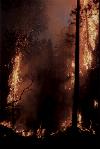|
Packed in the belly of an Mi-8
helicopter, a battle-weary crew heads back to base.
Seven days of fighting wildfire in the Siberian
hinterland? Just another week on the job.
National Geographic, 8/02
Holding a fourth of the world's forest, Russia
faces a daunting number of wildfires - between
20,000 and 35,000 each year. With more moxie than
money, the world's first and largest aerial
firefighting force snuffs wildfires across 11 time
zones. Fires may burn undetected and unchallenged
in the most remote areas, but the country's 4,000
smokejumpers put out thousands that no one else can
reach.
As many as 20 firefighters can rappel to a fire
from a turbo-powered Mi-8 helicopter, but the
Russians haven't forgotten their roots. They also
parachute from decades-old biplanes, much as they
did when they pioneered smokejumping in the 1930s.
Jumping is the thrill that gets them hooked. "Two
minutes fly like eagle, three days dig like
mole,: Valeriy says of the smokejumper's
life.
|

|
Where there's a fire, there's a smoke.
Asked whether he would rather run out of
food or tobacco, one smokejumper says,
"You can catch fish in the river, but
cigarettes?" The men don't worry much
about getting short-winded - most fires
move slower than they do. When flames
crown into treetops, it's usually a brief
show. Sunlit smoke whispers the
firefighter's secret: Life can be
beautiful even when the world burns down
around you. As fire crackles through a
forest's understory, clearing brush
and
|
preparing the ground for new life, it's hard for
even a sworn adversary not to respect its role in
the ecosystem. "Fires are natural," one smokejumper
says, "but it's our job to fight them."
With budgets tight and boots loose, rags stand
in for socks and saplings double as tent poles.
"Ten years ago we had more guys, but the equipment
was bad," says one veteran smokejumper. "Now we
have fewer guys, and the equipment is still bad!"
After quickly turning a sapling into a shovel
handle, one firefighter attacks with sand while
another beats the flame with birch branches. If
smokejumpers kill a fire quickly, it adds a bonus
to their monthly hundred-dollar pay. With their
mismatched uniforms and 50-year-old biplanes,
Russian smokejumpers do what their countrymen do so
well: make do with less.
Fast food, smokejumpers style: Pull it from
the river and eat. Raw or cooked, fish is a welcome
addition to starchy rations of potatoes and
noodles. When downtime comes and cards are dealt,
the insults that fly are even stronger than the
tea.
With helicopter fuel scarce in the post-Soviet
economy, firefighters who get left behind when the
job is done may have to wait days for a ride out.
But even after budget cuts have halved their ranks,
an uncertain future doesn't scare men who drop from
the sky to do battle with fire. "Put us in the
woods with matches and a fishing rod, and we can
live," Valdimir says.
Drop in on a video interview with the author and
photographer as they recount their time in Russia -
on and off the fire line - at nationalgeographic.com/ngm/0208
Books
* * *
Believe me! The secret of reaping the greatest
fruitfulness and the greatest enjoyment from life
is to live dangerously! - Friedrich Wilhelm
Nietzsche

Contact
Us |
Disclaimer
| Privacy
Statement
Menstuff®
Directory
Menstuff® is a registered trademark of Gordon
Clay
©1996-2023, Gordon Clay
|